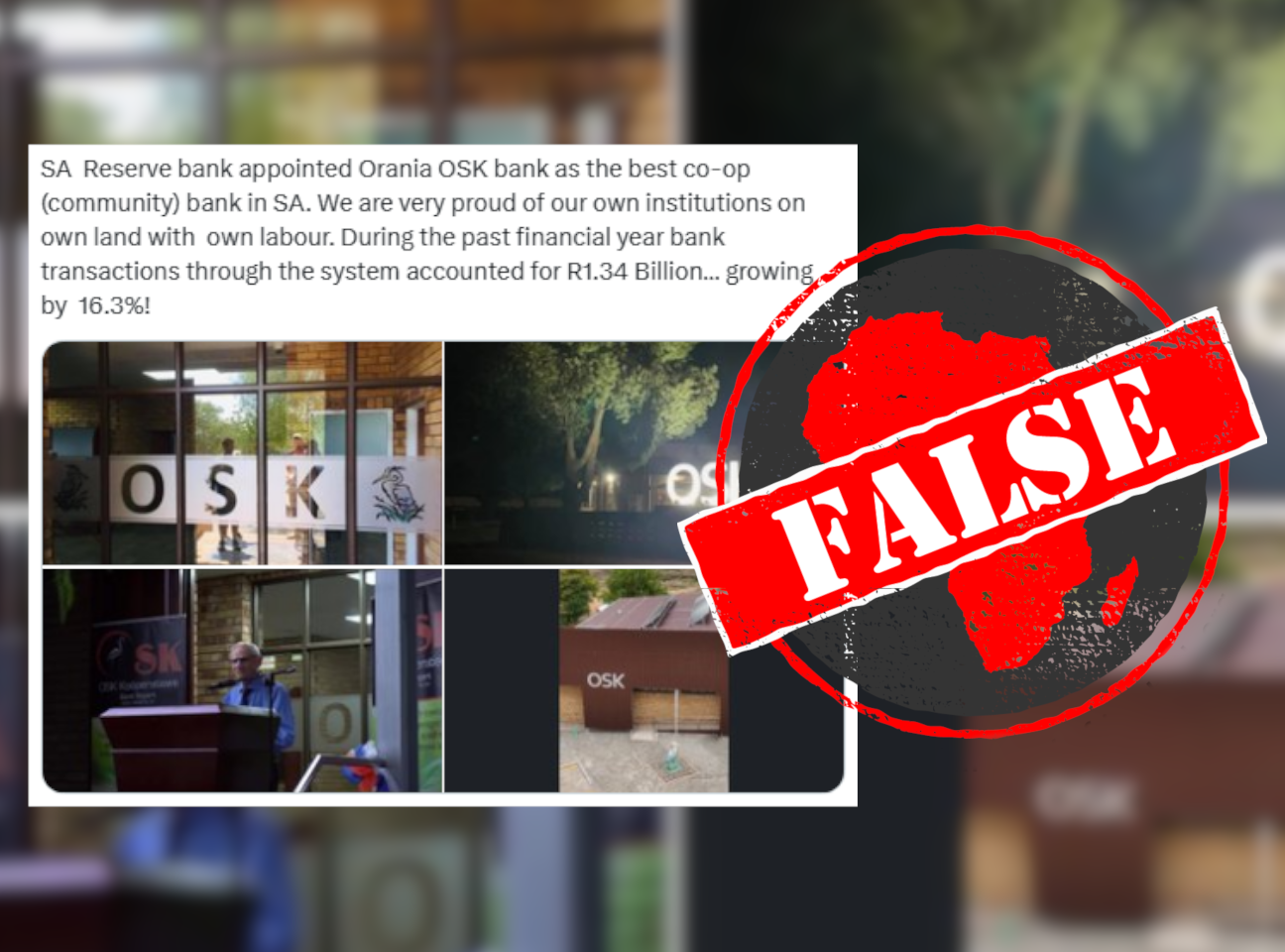IN SHORT: South Africa’s central bank didn’t give an award to Orania’s OSK Koöperatiewe Bank and clarified that it does not rank or award banks. OSK was given prizes in previous years for performance achievements by the agency that manages co-operative banks in the country.
Orania, a controversial settlement in South Africa’s Northern Cape province, was thrust into the social media spotlight in February 2024. An account on X, the social media platform previously known as Twitter, posted: “SA [South African] Reserve bank appointed Orania OSK bank as the best co-op (community) bank in SA.”
The account uses the Orania community’s flag as a profile picture. The initial tweet has been viewed over 580,000 times, while other versions of the claim appeared elsewhere on X and on Facebook here, here, here, here and here.
Orania was established in 1991, shortly before South Africa’s first democratic elections in 1994 and the end of the official government policy of apartheid. Orania was intended as an “independent homeland” for white Afrikaners. It reportedly has an all-white population, and is widely considered a symbol of racial segregation.
The community has established its own schools, radio stations, and even its own money, the “Ora”. The Ora has its own banknotes, but is not recognised legally as a currency.
The town does have its own recognised bank, a co-operative registered as OSK Koöperatiewe Bank (OSK) in 2011. Unlike commercial banks, co-operative banks are owned by members, not shareholders, and emphasise providing services rather than maximising profits.
While the South African Reserve Bank (SARB) is the country’s central bank, overseen by the national assembly, the Co-operative Banks Development Agency (CBDA) manages co-operative banks in the country, and is overseen by the national treasury.
The mandate of the SARB is to “protect the value of the currency in the interest of balanced and sustainable economic growth”, with regards to the South African Rand. Some of the SARB’s key responsibilities include regulating financial institutions, managing the country’s foreign reserves and payments system, and issuing or destroying physical money.
But the SARB does not give awards to banks. And after the initial claim gained traction on social media, the SARB said on X: “This is fake news. The SARB does not rank or award banks.”

Prizes from the Co-operative Banks Development Agency
The CBDA holds a regular indaba, or gathering, which brings together people in the co-operative banking sector. Here the CBDA gives out awards to banks for various achievements.
According to a CBDA publication, in 2013 the OSK was rated the largest co-operative bank in terms of assets: “OSK Co-operative Bank has assets of R51 million with R45 million in savings deposits … as at September 2012.”
In the CBDA’s 2020/21 annual report, the OSK bank was awarded a certificate as the “Best Performing Co-operative Bank … in recognition of outstanding performance, responsible governance, and consistent compliance”. In the most recent annual report available, from 2022/23, the OSK came in third place for performance.
An account that appeared to belong to a leader within the community pointed out the error in the original tweet, to which the original poster replied: “I was under the wrong impression that it was the Reserve bank. Although they surely must have knowledge of when banks registered with them receive awards, they were not the ones to award it. Apologies for the misunderstanding.”
But the original tweet has not been deleted and the claim remains in circulation on multiple platforms at time of writing.
Republish our content for free
For publishers: what to do if your post is rated false
A fact-checker has rated your Facebook or Instagram post as “false”, “altered”, “partly false” or “missing context”. This could have serious consequences. What do you do?
Click on our guide for the steps you should follow.
Publishers guideAfrica Check teams up with Facebook
Africa Check is a partner in Meta's third-party fact-checking programme to help stop the spread of false information on social media.
The content we rate as “false” will be downgraded on Facebook and Instagram. This means fewer people will see it.
You can also help identify false information on Facebook. This guide explains how.


Add new comment